-
 Published: Apr 1, 2025
Published: Apr 1, 2025
-
 13 min. read
13 min. read
-
 Abby Fields
Abby Fields Branded Content Specialist
Branded Content Specialist
- Abby is a data-driven content marketer with certifications in inbound marketing and content marketing. She’s written hundreds of articles covering digital marketing topics — a few of her specialties include first-party data, marketing and data analytics, marketing strategy optimization, and SEO. When she isn’t writing or optimizing content, Abby loves to spend time reading the latest mystery novel, having movie marathons with lots of snacks, and jamming out to Shania Twain.
What is SEO in digital marketing?
SEO in digital marketing is a strategy that focuses on your website’s presence in the search results. It involves various techniques to help you improve your rankings.
Search engine optimization (SEO) is a critical component of your digital marketing strategy. It can help more members of your target audience discover your business online, so you can expand your reach and increase your revenue.
However, SEO in 2025 isn’t the same as it was five years ago, and staying current is essential for an effective strategy. Voice search, mobile-first indexing, and AI-driven results all influence what SEO is and how it works now.
On this page, we’ll cover the basics of SEO to help you prepare your strategy for 2025:
- What is SEO?
- How does SEO work?
- How do search engines work?
- What are the benefits of SEO in digital marketing?
- What are the types of SEO?
- How does SEO in digital marketing compare to SEM and PPC?
- Common SEO myths
- FAQs on SEO
What is SEO?
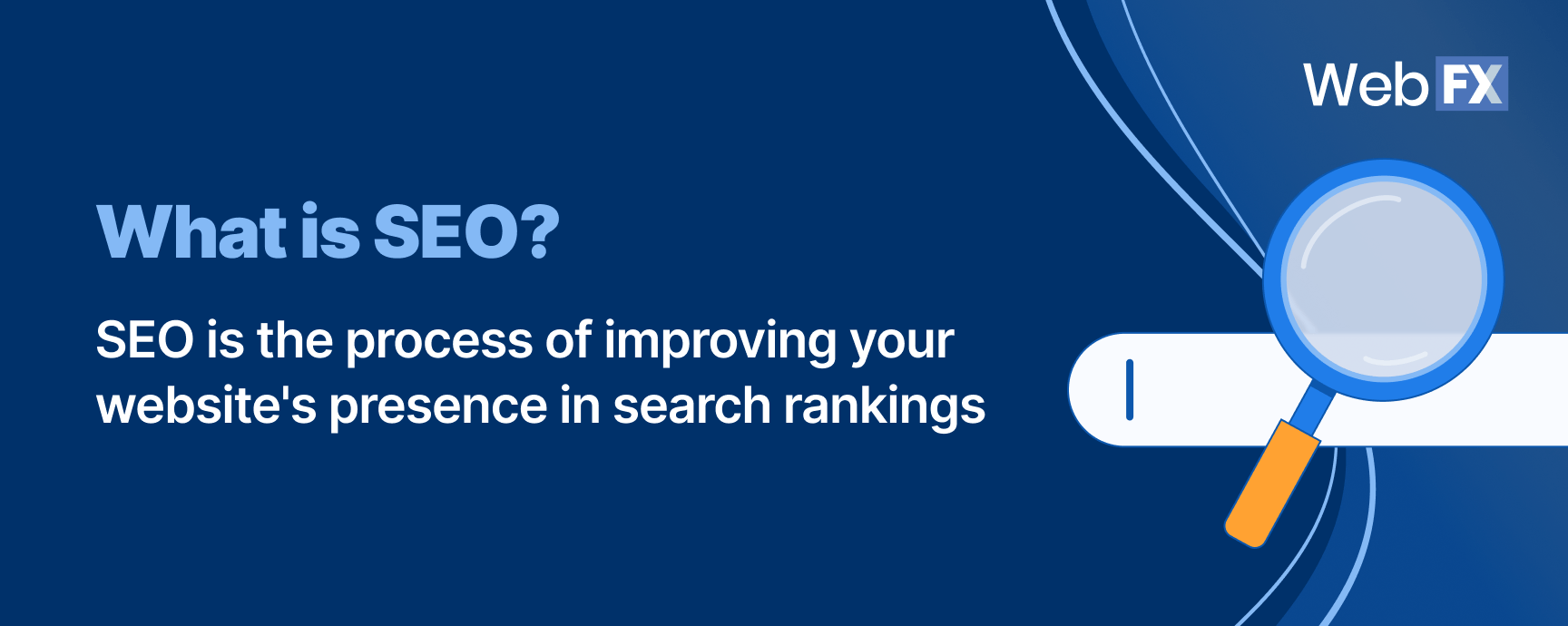
SEO is a strategy that focuses on your website’s presence in search results on search engines like Google. It involves using various techniques to improve your website to help both search engines and consumers better understand your website.
How does SEO work?
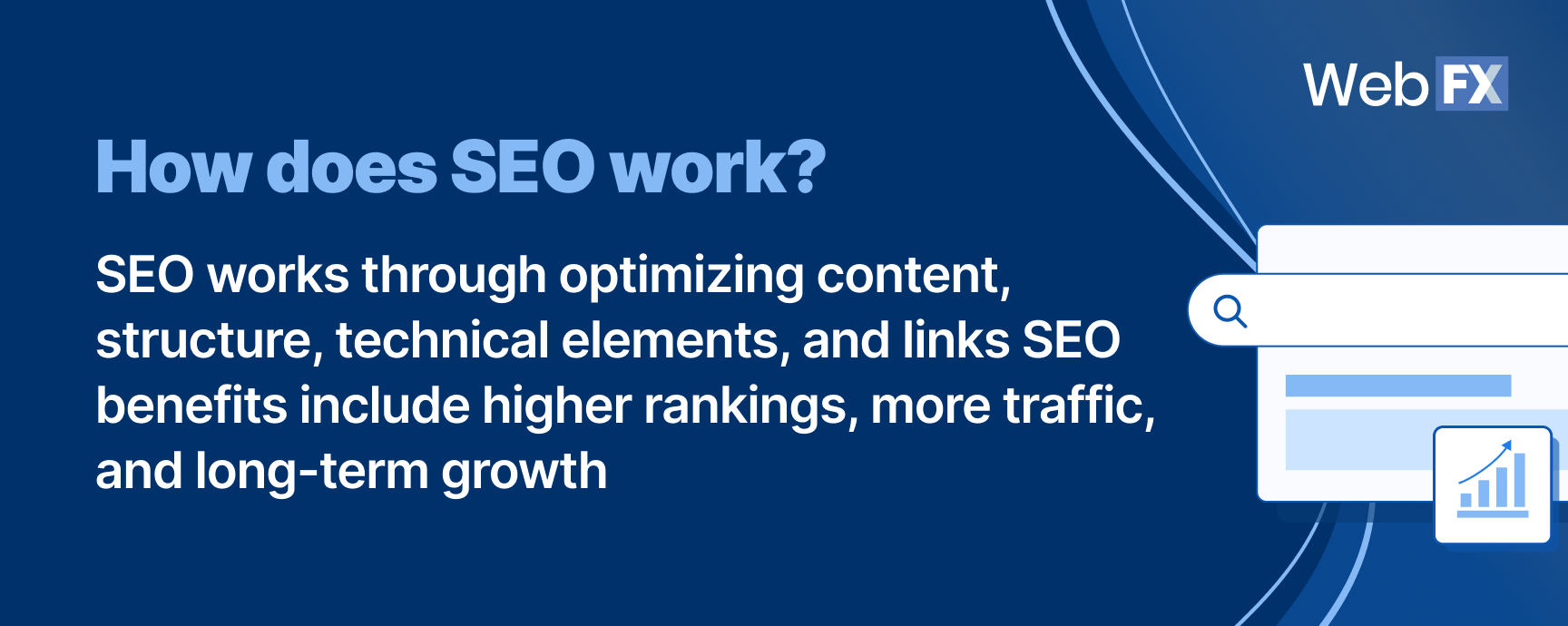
When you implement an SEO strategy, you optimize your website to show up in the search engine results pages (SERPs) for keywords and phrases related to your business. You can use tools like Google or KeywordsFX to help you find target and related keywords for SEO.
You’ll also submit your website URLs to Google (and other search engines) so they can show up in the SERPs. You’ll also use tools to track your analytics and see what changes are contributing to your growth and what you need to keep working on.
With SEO, you’ll implement techniques that improve your website’s user experience (UX) to ensure that your site gives your audience answers to their queries. Successful SEO means satisfying the searcher’s need, so you should create content that answers users’ questions and solves their problems.
These improvements will send positive signals to search engines that your website provides value to users. As a result, search engines will rank your website higher in the SERPs, and you’ll have more chances at traffic, leads, and sales.
Note: SEO is not a one-time task but an ongoing process. Continuous content updates, regular audits, and keeping up with algorithm changes are all part of a quality SEO campaign. Achieving and maintaining good rankings requires consistent effort over time.
How do search engines work?
The hub of SEO — the search engine framework — is the key to understanding why SERPs showcase certain pages over others. Search engines are intricate systems that study all the websites across the Internet and organize the information for you.
So, how do search engines like Google, Bing, and Yahoo digest such an immense amount of data? Search engines go through three steps — crawling, indexing, and ranking — to yield the strongest results.
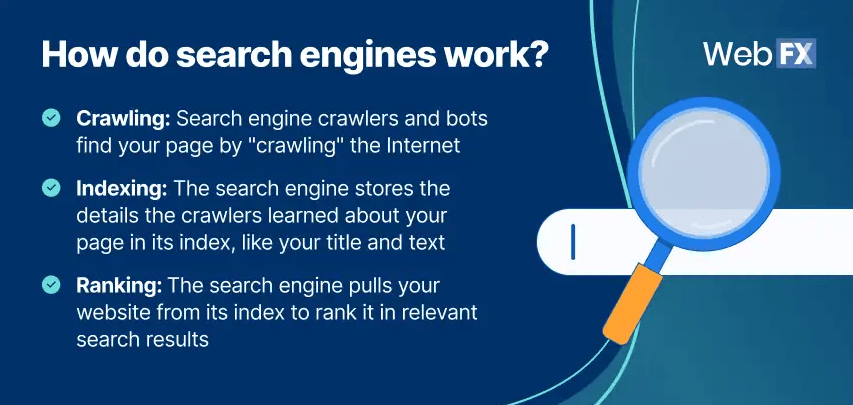
The anatomy of a search result
Let’s start by exploring what a search engine results page (SERP) looks like. A SERP consists of paid and organic results, as well as other features such as featured snippets, People Also Ask (PAA), and more:
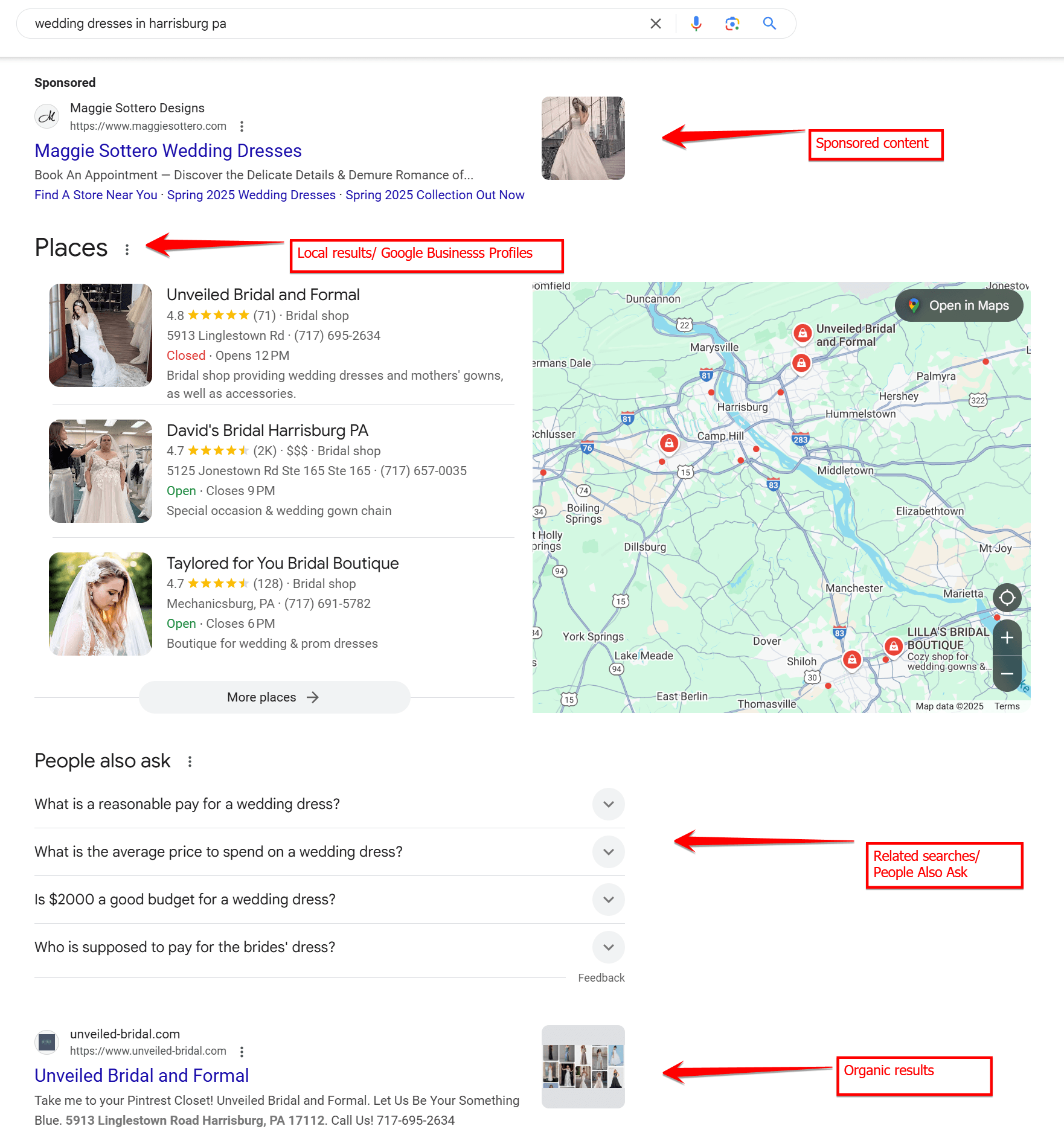
Paid results consist of websites that have paid Google to appear at the top of the search results. You can identify them by the “Sponsored” tag that appears above the title.
For this SERP, we also have local results, so there are Google Business Profile rankings and PAA. The three local results are known as a local three-pack, and they showcase the top organic, local results for a given search.
At the bottom, you’ll see the organic results that make up the rest of the page. These websites haven’t paid to appear in the results. Google picked them to appear based on a number of ranking factors, like relevance, keyword targeting, UX, and more.
If your site ranks well organically, you would appear in the local three-pack or as the very top organic result!
Crawling and indexing
Search engines use special bots or search crawlers to inspect all the nooks and crannies of the Internet.
They find websites by “crawling” from URL to URL, and as they move through pages, the bots scrutinize the main text and supplementary parts of the page.
Search bots collect these details in a comprehensive index, and they’re sorted into categories based on the title, URL, media, and text. This pool of websites gets dipped into later when someone searches related words.
The crawling mechanism also follows the links on pages, which act as trails across the web. If your website isn’t easy for the crawlers to locate, it can remain invisible to search engines and be left off the index.
Ranking
The contents of the index then serve as candidates for searches, and further algorithms determine how well it matches search terms or “keywords.”
However, keywords aren’t the only thing that matter for ranking. You must understand what the searcher really wants and provide it. Aligning with user intent will serve them better and prove your reliability.
So, if your page answers search intent, is informative, and meets a variety of other standards, it has a better ranking.
Organic and paid results
There are also two types of results you’ll find — organic and paid results. The difference between organic search and paid search is organic search is free, and paid search is paid.
When you submit a search to a search engine, the results display paid and organic listings — paid listings will have the word “Ad” attached to them. Click on a paid listing, and the advertiser will pay for that click. Click on an organic listing, and the website owner will pay nothing.
SEO is all about improving your rankings in organic search results to create tangible results for your business. Organic SEO can drive 1,000%+ more traffic than organic social media alone, so it’s worthwhile to pioritize organic improvements.
What are the benefits of SEO in digital marketing?

SEO is an essential strategy that can help your business grow and reach new heights. SEO leads have a 14.6% close rate on average, meaning the traffic you bring in can easily turn into paying customers.
Check out more benefits of SEO in digital marketing below:
- Boost online visibility: SEO helps you boost your online visibility and brand awareness. When you implement an SEO strategy for your business, your website will appear higher in the search results. That means more members of your target audience discover your business online.
- Increase website traffic: You can drive more traffic to your website when you increase your rankings in the SERPs. As a result, more users visit your website, read your content, and check out your products and services to increase sales and revenue for your business.
- Stand out from competitors: SEO enables you to outrank your biggest competitors in the search results. That means you cans show your expertise in your field to outshine your competitors and attract new customers.
- Build credibility: Being on the first page of Google can make your business appear more trustworthy to users, in part due to Google’s reputation. Considering that 91.5% of people don’t go to page two of results, you’re automatically more reputable just for ranking higher.
SEO is a valuable strategy that enables you to acquire new customers and continuously promote your products and services online to drive more sales and revenue for your business.
What are the types of SEO?
Before you start implementing an SEO strategy for your company, it’s essential to first understand the different types of SEO in digital marketing, also known as the pillars of SEO.
Here are the types of SEO in digital marketing:
-
- On-page SEO
- Off-page SEO
- Technical SEO
- Local SEO
- Specialized SEO
Read: Your Comprehensive SEO Checklist
1. On-page SEO
On-page SEO refers to optimizations that take place directly on your website to improve your SEO. With on-page SEO, you focus on ensuring that your website is easy to use and provides value to users by answering their questions and giving them solutions to their queries.
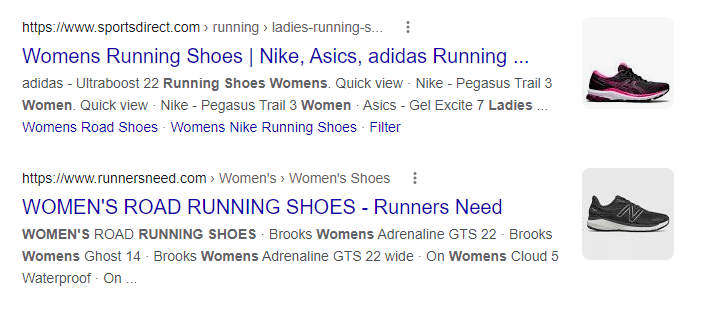
Here are a few elements you can focus on optimizing with on-page SEO:
On-page SEO enables you to improve your website to help users and search engines better understand your website. For example, by optimizing your titles, you can inform search engines and users about your page’s topic. As a result, you can increase your rankings and encourage users to click on your site.
2. Off-page SEO
Off-page SEO refers to optimizations that take place outside of your website. With off-page SEO, you focus on your website’s authority. While your website or domain authority isn’t an official Google ranking factor, it can help boost your rankings by creating a site with valuable content that people and websites link back to.
This process can involve earning links from other websites, shares on social media platforms, and other mentions of your website across the Internet. Off-page SEO can include:
- Creating accurate, valuable, and high-quality content
- Sharing your content on social media
- Connecting with influencers
- Reaching out to other websites to host something that you’ve written
Your authority can determine whether search engines and users view your business as an expert in your field. And a high authority will help your online reputation and search rankings blossom.
3. Technical SEO
Technical SEO refers to optimizations that make your website easy for search engine crawlers and users to use and understand. Search engine crawlers index pages and websites for search engines. In other words, search engine crawlers help search engines store your page and website data to use for future searches.
With technical SEO, you focus on optimizing the back-end of your website, such as your:
- Page load speed
- Navigation
- Image integration
- And more!
Your page design, navigation, and loading speed impacts how easily your audience and crawlers can use and understand your website. When your website loads quickly and ensures that users can easily find the information they need, you can help your site rank higher in the SERPs.
Mobile-first indexing is also a crucial part of technical SEO. Google prefers websites that optimize for searchers. After all, 60% of Google searches come from mobile devices, so it’s essential to prioritize those users’ experiences.
4. Local SEO
Local SEO is the process of targeting local-specific search results. These results are key for small businesses and any company with a particular service area. This type off SEO drives local traffic to your website and helps you narrow your target audience on search engines.
To target local SEO, you might:
- Set up your Google Business Profile
- Prioritize earning local reviews
- Optimize for “near me” queries
- Build out local content
All of these tasks and more will help people in your area be more likely to find and patronize your business.
5. Specialized SEO
Finally, there is specialized SEO for specific platforms outside of the regular text-based search on Google. For example, you can used specialized SEO for:
- Image search
- Video search/YouTube
- Ecommerce rankings
The breadth of SEO goes beyond standard search in 2025. Having specialized tools and strategies is essential for a well-rounded approach.
How does SEO in digital marketing compare to SEM and PPC?
While exploring SEO strategies, you might come across the terms search engine marketing (SEM) and pay-per-click (PPC) advertising. If you’re wondering what these terms are and how they differ from SEO, we’ve got you covered.
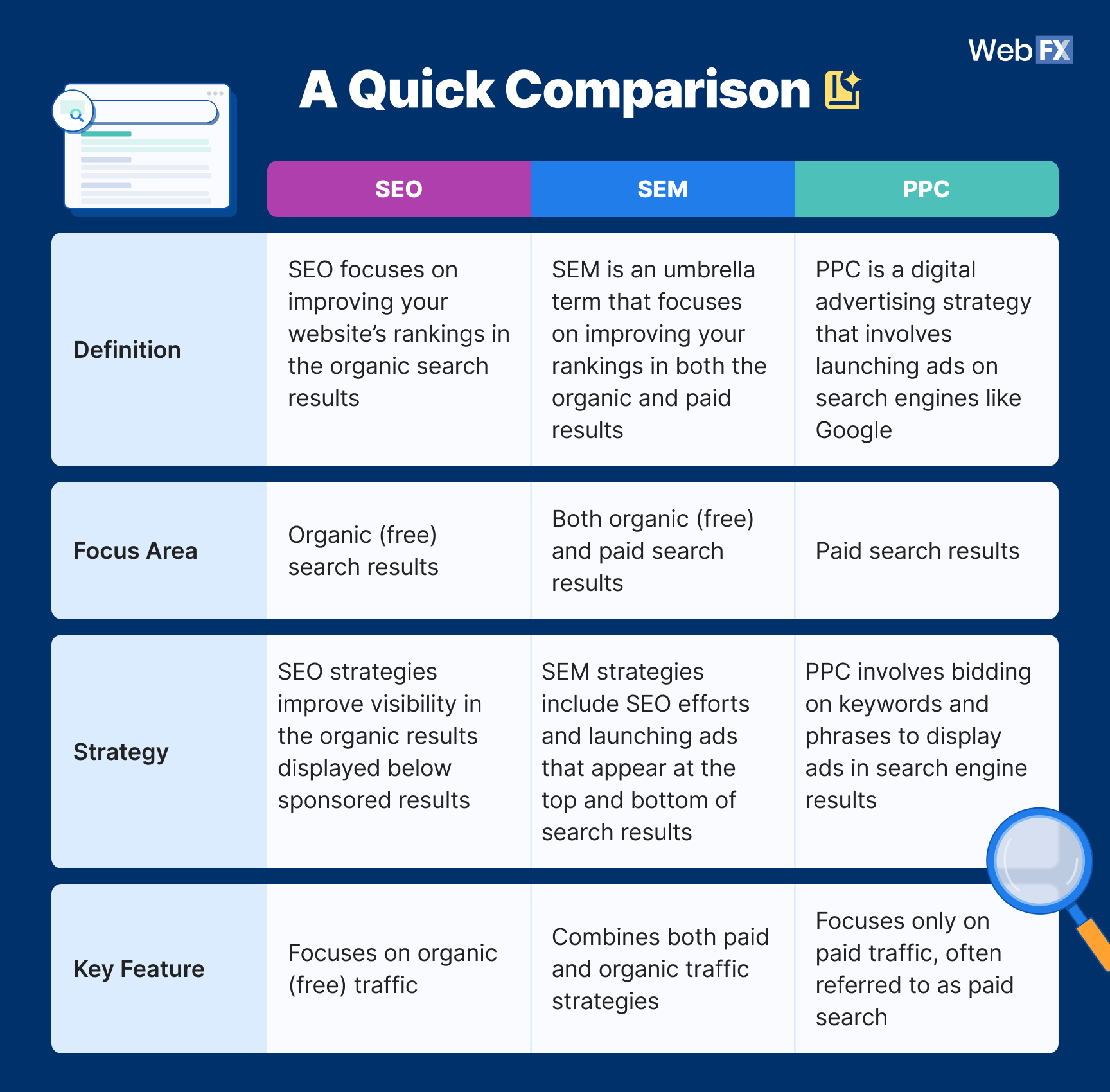
SEO vs. SEM
Like we discussed above, SEO focuses on improving your website’s rankings in the organic search results. These are the results that display below the sponsored (paid) results.
SEM, on the other hand, is an umbrella term that focuses on improving your rankings in the both the organic and paid results. As a result, if you implement a SEM strategy, you’ll find yourself launching ads that appear at the top and bottom of the search results.
SEO vs. PPC
PPC is a digital advertising strategy that involves launching ads on search engines like Google. It’s often referred to as paid search.
With PPC, you’ll bid on keywords and phrases that you want your website to appear for in the search engine results.
So, PPC focuses on the paid side of search engine marketing, while SEO focuses on the organic (free) side.
SEO vs. SEM — Which is right for me?
Most companies use a mix of SEO and SEM, as they complement each other and contribute to your businesses overall growth.
But, which should you use?
If you want to focus on long-term growth, have a lower budget, and want to improve the quality of your website, focus on SEO.
If you want to target immediate visibility, stand out in a competitive industry, or promote particular products and services, consider using SEM.
Common SEO myths
SEO has been around for a while, which has led to some common myths about how it works and who can use it. Let’s debunk common SEO myths below:
Myth #1: SEO is a scam
SEO is not a scam. It is a legitimate tactic for targeting search engine results. Though there are scams out there, SEO itself is not a scammy or fraudulent strategy.
Per the latest SEO statistics, 50% of marketers say SEO provides a better return on investment (ROI) than any other marketing strategy. With results like that, it’s clear that SEO has the power to make real change for businesses.
Myth #2: Only experts can do SEO
False — anyone can do SEO!
However, the quality of your results might look different depending on whether you do in-house SEO or work with an agency. SEO experts often have more resources, time, and experience to create efficient SEO campaigns for clients.
Myth #3: SEO yields instant results
SEO is not meant to be an instant fix. Any company trying to sell it as one is likely a scammer trying to overpromise. It takes time and consistent effort to see returns on your SEO campaign.
FAQs on SEO
Have more questions about SEO? Learn more with our FAQ section!
How much does SEO cost?
On average, SEO costs $500 – $7,500 per month, depending on factors such as your deliverables, SEO needs, and goals.
What happens if you ignore SEO?
Neglecting SEO often means handing over potential traffic (and customers) to competitors. Without SEO, it will be harder for customers to find you online. They will go to competitor websites by default, causing you to miss out on valuable leads and sales.
Does SEO work with other marketing channels?
Yes! SEO can amplify other marketing strategies and help you create a holistic digital marketing approach.
For example, you can use SEO to boost content marketing (and vice versa). Insights from SEO can also improve PPC campaigns by reflecting the current search landscape and challenges. You can also use SEO tactics to improve social media posts.
How long does SEO take to show results?
SEO can take anywhere from six months to over a year before you start seeing results. Your results will vary based on how much time, effort, and consistency you put into your campaign, as well as your industry and budget.
Boost your website’s performance with WebFX
Want to elevate your digital marketing? WebFX is here to help! Our expert SEO services will increase your online visibility, drive more traffic, and help you outshine the competition.
Get your custom SEO proposal today and let us use our proven strategies to enhance your search presence and boost your revenue!
-
 Abby is a data-driven content marketer with certifications in inbound marketing and content marketing. She’s written hundreds of articles covering digital marketing topics — a few of her specialties include first-party data, marketing and data analytics, marketing strategy optimization, and SEO. When she isn’t writing or optimizing content, Abby loves to spend time reading the latest mystery novel, having movie marathons with lots of snacks, and jamming out to Shania Twain.
Abby is a data-driven content marketer with certifications in inbound marketing and content marketing. She’s written hundreds of articles covering digital marketing topics — a few of her specialties include first-party data, marketing and data analytics, marketing strategy optimization, and SEO. When she isn’t writing or optimizing content, Abby loves to spend time reading the latest mystery novel, having movie marathons with lots of snacks, and jamming out to Shania Twain. -

WebFX is a full-service marketing agency with 1,100+ client reviews and a 4.9-star rating on Clutch! Find out how our expert team and revenue-accelerating tech can drive results for you! Learn more
Try our free Marketing Calculator
Craft a tailored online marketing strategy! Utilize our free Internet marketing calculator for a custom plan based on your location, reach, timeframe, and budget.
Plan Your Marketing Budget

SEO Success with KOA

Proven Marketing Strategies
Try our free Marketing Calculator
Craft a tailored online marketing strategy! Utilize our free Internet marketing calculator for a custom plan based on your location, reach, timeframe, and budget.
Plan Your Marketing Budget
What to read next





